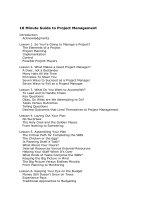FORTBILDUNGSZENTRUM FÜR TECHNIK UND UMWELT (FTU): International Management Courses 2011 doc
Bạn đang xem bản rút gọn của tài liệu. Xem và tải ngay bản đầy đủ của tài liệu tại đây (209.89 KB, 32 trang )
KIT – University of the State of Baden-Wuerttemberg and
National Laboratory of the Helmholtz Association
FORTBILDUNGSZENTRUM
FÜR TECHNIK UND UMWELT (FTU)
Deadline for
Registrations: 10 days before the course starts
Course Fee: see course description
Teams and Conditions:
On receipt of the registration in writing, a confirmation and an invoice in
the amount of the course fee will be sent out by FTU. The course fee is VAT
exempted. If no other terms and conditions are specified, the fee shall be
due for payment without any deductions within 14 days upon receipt of the
invoice; otherwise, participation cannot be guaranteed. The course fee inclu-
des the training material and refreshments during the breaks. Registrations
are considered and confirmed in the order of their receipt by FTU. A course
certificate is issued after completion of the course and receipt of the course
fee. Any cancellations of registrations shall be made in writing. In case of
cancellation later than three weeks before the start of the course, a hand-
ling fee of 25% of the total amount of the invoice shall become due. Upon
failure to attend the course without having sent a written notice of cancel-
lation before, the total amount of the invoice shall be due for payment. In
exceptional cases, e.g. unforeseen non-availability of a key-lecturer or insuf-
ficient number of registrations received, FTU reserves the right to cancel the
course up to one week prior to its scheduled start. In these cases, the course
fee already paid shall be reimbursed. Any claims against the Karlsruhe Insti-
tute of Technology exceeding such reimbursement of the course fee shall be
excluded. The place of jurisdiction shall be Karlsruhe.
Data protection: Course participants’ personal data are processed for corre-
spondence purposes and preparation of the participants’ individual training
documents. Private addresses and dates of birth are required for issuing
certificates of attendance acknowledged by the regulatory authorities, and
for admission to the Karlsruhe Institute of Technology, if site visits form part
of the course program.
Accomodation:
A list with hotels will be provided after registration. Participants are respon-
sible for their own hotel accommodation.
Information and registration:
Karlsruhe Institute of Technology (KIT)
Fortbildungszentrum für Technik und Umwelt (FTU)
Postfach 36 40, 76021 Karlsruhe, Germany
Frau Eltje Witt
Fon: +49 7247 82-4044
Fax: +49 7247 82-4857
Email:
Venues:
See course description
Internet:
www.fortbildung.kit.edu
Please return to:
Karlsruhe Institute of Technology (KIT)
Fortbildungszentrum für Technik und Umwelt (FTU)
Frau Eltje Witt
Postfach 36 40
76021 Karlsruhe
GERMANY
International
Management
Courses 2011
✂
Date
Signature
Organisational Development Needs
International Training
Studies say that universities and research organisation
very often pay little attention to international training
and management development. To ignore international
training could have an adverse impact on the develop-
ment of these organisations.
Therefore, further education and training on an interna-
tional level is a must. You make sure that the develop-
ment of your organisation goes into the right direction. It
also means to invest into the capability of your staff who
works in a diverse, globalized workplace and market-
place.
Social competence, communication skills, project manage-
ment skill, leadership skills, cross-cultural awareness and
other skills are becoming increasingly important. These
skills are essential for a performance and innovation-
driven corporate culture.
The main purpose of our courses is to provide opportu-
nities for participants to develop the necessary skills and
processes through targeted, interactive training in order
to improve business and personal performance. All our
tutors are internationally experienced.
The courses and workshops are held in English and the
number of participants is limited in order to ensure high
quality standard.
We have got decades of experience in designing and
delivering training courses, workshops and conferences to
an international audience.
Join our courses and benefit!
Responsible course manager:
Rudolf Wöste
Registration Form
Fax +49 7247 82-4857
Title/Last Name/First Name
Position held
Company/Organisation
Department
P.O. Box/Street/No.
Postal Code/Coty/Country
Fon Fax
The course fee will be transferred on receipt of the
invoice.
2 31
EUR
Course No. Date Course fee
EUR
Course No. Date Course fee
EUR
Course No. Date Course fee
Please copy this page for further registrations.
The Programme
• What is a contract?
• Why have contracts?
• Contract construction
• Who makes the contract?
• Forming the contract
• Creating a formal contract in writing
• Prioritise expectations and requirements
• Avoid unreasonable promises
• Deal with complexity in the contract
• Objectives and approaches of negotiations
• Strengths, weaknesses and balance of power
• Preparation and planning negotiations
• Conducting the negotiation
• Management relationships
• Service levels
• Managing change
• Contract duration and termination
• Managing disputes
• Avoiding termination of the contract
• Formal methods for dispute resolution
• Legal risk management
• Contracts and procedures
• Risk assessment and control
Dates: 11/03/2011 Start of course: 09:00
07/10/2011 End of course: 16:15
Course fee: 455 EUR
The fee includes the meeting package
of Helmholtz Office.
Venue:
Helmholtz Office, Rue du Trône 98, 1050 Brussels, Belgium
3
All FTU courses: www.fortbildung.kit.edu
Page
Leadership – Managing and Motivating Teams (MM105) 4
Giving High Performance Presentations (MK345) 6
Effective Negotiations (MK355) 8
Cross-cultural Communication (MK360) 10
Writing in English – A Workshop for Scientists and
Engineers (MK301) 12
How to Write Successful FP7 Proposals (MB420) 14
Financial Management in FP7 Projects (MB451) 16
Successful International Project Management I
(Basic) (MP205) 18
Successful International Project Management II
(Advanced) (MP208) 20
Coordination of Complex Projects (MP206) 22
Management of Project Risks (MP207) 24
Microsoft EXCEL – A Tremendous Tool for Project
Management (IO225) 26
Management of Intellectual Property Rights (MB453) 28
Good Contract Management (MB452) 30
Overview
4
Trainer
Ken Taylor
Taylor Consultancy Ltd., London, UK
Leadership: Managing and Motivating
Teams (MM105)
Leaders are made not born. As a leader, you need the support
of your team, peers and seniors and you have to interact with
them. To gain their support, you must be able to understand
and motivate them. There are certain things you must know and
do in order to inspire your team. Good leaders are continually
working and studying to improve their leadership skills. The
course provides the skills modern team leaders need to interact
with their teams and a toolbox to help them apply those skills
effectively.
The course focuses on the skills a modern team leader needs and
enables you to benchmark your own abilities. You will be given a
toolbox for team leaders and taught how and when to apply the
various tools. You will learn motivational and empowering skills
and, where appropriate, how crosscultural considerations can
affect the work of international teams.
The following topics will be covered:
• Benchmarking your leadership qualities
• The Team Performance Toolbox
• Bottlenecks and challenges for team leaders
• Applying some of the tools to meet these challenges
• The international context
• Dealing with different people
• Motivating and empowering people.
The course is designed for all people who are leaders or those
who want to prepare themselves for future leadership roles.
5
The Programme
Leadership
• „Robots“ – a group communication activity
• What is leadership?
• Leadership style self-assessment
The Team Performance Toolbox
• Understanding the 5 stages of how teams work
Bottlenecks and challenges for leaders
Applying the tool box
• Practice with feedback
The international context
• Working with different value systems
• Bridging culture gaps
Dealing with different people
• The social style of concept
• Self and group assessment
• Style-shifting and versatility
• Practice with role plays and feedback
Motivating and empowering people
• How are people motivated?
• Setting targets
• Listening skills
• Feedback
• Coaching
Dates:
1)
17/05 – 18/05/2011 Start of course: 09:00
End of course: 16:15
2)
18/10 – 19/10/2011
Course fee: 895 EUR
The course fee includes the meeting package of
the venues.
Venues:
1)
Akademie Hotel
Am Rüppurrer Schloß 40, 76199 Karlsruhe, Germany
2)
Helmholtz Office,
Rue du Trône 98, 1050 Brussels, Belgium
6
Trainer
Ken Taylor
Taylor Consultancy Ltd., London, UK
Giving High Performance Presentations (MK345)
Presentations are a natural part of any professional job. Today,
nearly everybody has to make a presentation sometimes. Your
audience only has the chance to hear what you say once. They
can‘t „re-read“ it when they get confused. So it is very important
that your audience understands and remembers your message.
This course is to help you to present more effectively in English
to an international audience. You will practice how to influence
and make an impact on them. You will learn how to deal with
any difficult situations which could arise during the presentation.
You will feel more confident and relaxed when presenting in
English. Personal feedback from the trainer will make you aware
of your strengths and enable you to make the most of your per-
sonal talents and qualities.
By the end of the course you will
• be able to structure your presentation to support your mes-
sage
• know how to open and close your presentation convincingly
• develop an interactive approach to your audience
• impact the audience through proven persuasion techniques
• be able to use visual aids for maximum effect
• feel more confident in speaking internationally
• have learnt how to control your “stage fright”.
Participants are asked to prepare two short presentations in
advance and bring them along to the course:
1. A one minute self presentation
2. A three minute professional presentation of some aspect of
your work
The training is not only beneficial to scientists and engineers but
also to all professionals who have to deliver presentations to
various audiences. The focus will be on technical / scientific pre-
sentations but many of the ideas are applicable to any business
presentation.
7
The Programme
• Self introductions with video feedback
• What makes a good technical / scientific presentation?
• 7 success factors
• Preparation and structure
• Openings and closings
• 3 minute practice presentation with video feedback
• Managing the audience
• Dealing with questions
• Visualisation techniques
• Preparation for practice presentations
• Practice presentations with video feedback
• “Stage fright”
• Persuasion techniques
• Teamwork presentations with feedback
• Personal action plans
Methods
Mini-lectures and demonstrations from the trainer covering the
most important aspects of making presentations; exercises and
practice in presenting to different audiences; detailed video
feedback and coaching on personal performance; feedback on
the impact of your verbal and non-verbal skills.
Dates: 28/03 – 29/03/2011 Start of course: 09:00
End of course: 16:15
Course fee: 895 EUR
The course fee includes the meeting package
of the hotel.
Venue:
Akademie Hotel
Am Rüppurrer Schloß 40, 76199 Karlsruhe, Germany
8
Effective Negotiations (MK355)
Negotiations are one of the most important parts of the day-
to-day business of professionals. This effective negotiation skills
course is based on the Harvard strategy and delivers the theore-
tical background for successful negotiations with colleagues as
well as with partners from different organisations and bodies.
The aims of the course are to gain more confidence when nego-
tiating in English, widen your range of negotiation techniques,
practise interest based negotiations and learn how to handle
difficult situations more effectively. It also gives you substantial
support in achieving your goals by practising. There will be a
strong focus on personal feedback.
The following topics will be covered:
• Various approaches to negotiations
• What makes a good negotiator?
• Planning and preparation tools
• Understanding the negotiation process
• Different stages of negotiations
• Understanding your counterpart
• Dealing with difficult situations and people
• Persuasion skills
• Raising intercultural awareness
The course is highly participative. It is designed for all individuals
involved in negotiations: research managers and administrators,
scientists, engineers, technical and administrative staff.
Trainer
Ken Taylor
Taylor Consultancy Ltd., London, UK
9
The Programme
What makes a good negotiator?
Three approaches to a negotiation
• The tactical approach
• The Harvard/Interest-based approach
• The 4-stage process
The “BEST” way to a negotiation – a 4-stage process:
• B for Building Relationship
• E for Exchanging Information
• S for Structured Negotiation
• T for Total Commitment
Intercultural awareness
• Cultures and clashes
• How to avoid misunderstandings
• Interpreting body language
• International English
Dealing with difficult situations
Personal action planning
Dates: 30/03 – 31/03/2011 Start of course: 09:00
End of course: 16:15
Course fee: 895 EUR
The course fee includes the meeting package
of the hotel.
Venue:
Akademie Hotel
Am Rüppurrer Schloß 40, 76199 Karlsruhe, Germany
10
Cross-cultural Communication (MK360)
As the world shrinks, our international contacts increase. It has
become more and more important to see yourself as people from
other cultures see you and to have some tools and techniques for
bridging any cultural gaps.
Speaking the same language does not guarantee understanding
and good communication when people come from different
cultures. A basic understanding of cultural diversity is the key
to effective cross-cultural communication. There are three
steps to good cross-cultural communication: understanding
and accepting yourself, accepting others, and adapting your
behaviour appropriately to the situation. Different perceptions,
conventions, and communication styles can block effective team
performance and productivity.
Our two day programme provides tools for you to define and
overcome potential difficulties in your international business
dealings.
The following topics will be covered:
• What is culture?
• How do we communicate?
• What are the 10 key cultural variables?
• How we can manage cultural differences in the work
situation?
The training course is designed for people from research centres,
universities, organisations, and private industry companies who
need to work, communicate and cooperate with foreign col-
leagues and partners, clients and customers.
Trainer
Ken Taylor
Taylor Consultancy Ltd., London, UK
11
The Programme
What is culture?
• Understand how important cross-cultural awareness is to
international success
Perception – attitudes, values and beliefs
• To illustrate how and why people see the world in different
ways
Going beyond stereotypes
• To show how stereotypes interfere in our understanding of
different cultures
Mindsets
• To create an awareness of our own mindset and the mindsets
of others
Dealing with linguistic and non-verbal misunderstandings
• To check our ability to communicate clearly
10 Cultural variables
• To become familiar with a tool for comparing cultural
differences and similarities
Style-shifting
• To understand and practice the concept of style-shifting
Managing the work situation
• To practise cross-cultural awareness in key work situations
Preparing for cross-cultural encounters
• To show the various resources available
Dates:
1)
19/05 – 20/05/2011 Start of course: 09:00
End of course: 16:15
2)
20/10 – 21/10/2011
Course fee: 895 EUR
The course fee includes the meeting package of
the venues.
Venues:
1)
Akademie Hotel
Am Rüppurrer Schloß 40, 76199 Karlsruhe, Germany
2)
Helmholtz Office,
Rue du Trône 98, 1050 Brussels, Belgium
12
Writing in English – A Workshop for Scientists
and Engineers (MK301)
When writing an article for a magazine or journal, or drafting
a report to submit to a government department or writing a
proposal to an evaluation committee, it is essential to use correct
English grammar and vocabulary. It is also necessary to write in
a style that is clear and accessible to the intended reader, so that
the article, report or proposal “does its job” properly.
In this workshop, we focus on how you can prepare yourself for
writing in an effective and professional way. Participants will
learn how to analyse, review and optimize their writing, to ensu-
re that it is presented in the best way possible.
The following topics will be covered:
• The publication profile: write in the appropriate style
• The reader profile: adapt the writing for the target readership
• Consider your real aim: inform, inspire, encourage curiosity,
“sell” an idea
• Planning and preparation
• Writing effective abstracts
• Good writing style: content, visual presentation, structure,
readability, grammar and terminology
• Common mistakes in English
• 3-stage review model
• “Readability” analysis
The course is designed for scientists, engineers, research mana-
gers and all other staff who have to write articles, reports or
proposals in English.
Trainer
A Robin Widdowson, BA Hons. (Social Studies)
Trainer in Communication Skills, Management Skills & Business
English, Bath, UK
13
The Programme
Examining good writing style
• Analyse your own writing style
• Appropriate writing style
• Appropriate structure
• Good writing
• Writing task
Reviewing your writing
Writing an abstract
• Writing task feedback
• Writing skills focus
• Review your writing effectively
• Writing an abstract
• Using graphics
• Extend your language data bank
Dates: 11/04 – 12/04/2011 Start of course: 09:00
End of course: 16:15
24/11 – 25/11/2011
Course fee: 895 EUR
The course fee includes the meeting package
of the hotel.
Venue:
Akademie Hotel
Am Rüppurrer Schloß 40, 76199 Karlsruhe, Germany
14
How to Write Successful FP7 Proposals (MB420)
FP7 proposals contain a number of well-known rules and parts
of FP6 proposals as well as new topics and measures. Successful
proposals have to meet all given criteria in order to pass the
different stages of evaluation and approval.
The course provides all the necessary details, guidelines, evalu-
ation criteria and measures in order to support proposal writers
successfully.
The following topics will be covered:
• Behind the scenes: What is the intention of FP7? What are
the constraints? What should proposal writers know and
keep in mind? What is the impact to individual proposal
writers?
• The strategy of writing a proposal
• How to collect information from existing proposals or
approved projects for the same topic
• Different projects and the influence on the proposal: Networks
of Excellence, large and small collaborative projects
• How to plan a proposal and what are the right steps forward?
• Key elements of FP7 proposals
• The importance of abstracts
• Checklists: What – when – who – with whom – how
• Evaluation criteria
• GANTT-charts, compulsory for the management plan
• How to find and select project partners
• Use of model contract for consortia
• How to minimize the administrative burden
• Adapted examples will be presented and discussed – course
participants may present their own projects
The course is specifically designed for project managers, scien-
tists, engineers, research managers, administrators and all other
people who are going to write a proposal or involved in contri-
buting towards a proposal.
Trainer
Dr Vladimir Maly
Helmholtz Office, Brussels, Belgium
15
The Programme
The intention of PF7 and the impact on proposal writers
The strategy of writing a proposal
Basic principles
• Bring your topic to Brussels
• Participation or coordination?
• Frame of intended project (funding schemes and others)
Topic based specialities and examples
• Scientific and technological excellence
• Implementation and management
• Potential impact
How to find project partners
Model contract for consortia
The administrative burden and how to cope with it
Adapted examples – What can we learn from them?
Dates: 05/07/2011 Start of course: 09:00
End of course: 16:15
16/11/2011
Course fee: 455 EUR
The course fee includes the meeting package
of Helmholtz Office.
Venue:
Helmholtz Office, Rue du Trône 98, 1050 Brussels, Belgium
16
Financial Management of FP7 Projects (MB451)
The workshop covers the financial management aspects of an
FP7 project in all phases of the project – from the preparation of
the proposal to the final audit after the end of the project.
Participants get a complete overview of the financial rules and
regulations of EU-projects and learn how to implement them in
a correct and efficient way.
The following topics will be covered:
• Basics of EC research funding
• Eligible and ineligible costs
• Financial management: in the proposal stage
• Financial management: after successful evaluation
of a proposal
• Financial management: during and after the lifetime
of a project
• Reporting
• EU audits
The workshop is essential for project managers, administrators
and other “financial” staff involved in EU research projects
whether as coordinators or partners. No prior knowledge or
experience in FP7 projects is required.
Trainer
Gerrit Bornemann
Helmholtz Office, Brussels, Belgium
17
The Programme
Basics of EC research funding
Principal funding schemes
Participation, subcontracting, third parties
Funding regimes, lump sums, flat rates
Funding rates, activities
Eligible and ineligible costs
Calculation of project budget
Negotiating financial issues in Grant Agreements and
Consortium Agreements
Reporting requirements and electronic reporting tools
Certificates on the financial statement
Certificate on the methodology
EC audits
Dates: 17/02 – 18/02/2011 Start of course: 09:00
End of course: 16:15
06/07 – 07/07/2011
17/11 – 18/11/2011
Course fee: 895 EUR
The course fee includes the meeting package
of Helmholtz Office.
Venue:
Helmholtz Office, Rue du Trône 98, 1050 Brussels, Belgium
18
Project management is a core skill in today's fast moving
research and business environment. This two-day course is de-
manding and intense and combines all tools and techniques into
realistic and participants’ oriented simulations. The emphasis is
on project management in a changing world and on appropriate
project structures as well as on how to run a project on a day-to-
day basis.
“Successful International Project Management I” is an invitation
to participants to listen, network, experience, and apply all the
offered methods and tools in order to benefit individually and
improve their project work.
The following topics will be covered:
• Life cycle and conflicts in projects
• Planning techniques
• Charts, diagrams and other tools
• Project organisation
• Team building, motivation and control
• Communication
• Time management principles
• Risk management
• Running a project on a day-to-day basis
• Estimating techniques, monitoring and control
• FP7 and other international projects
• Importance of intercultural issues in projects
• Lessons learned and project close
The course is beneficial to all professionals who are going to get
involved in projects or have already been in projects for a couple
of years and want to complete their project management tool
box.
Successful International Project Management I
(Basic) (MP205)
Trainer
Dr Susanne Rahner
Director, YGGDRASIL, Berlin, Germany
19
The Programme
Topics include for example:
• Life cycle of projects
• Importance of early project phases
• Conflicts in projects
• SMART and SWOT analysis
• Gantt and PERT charts
• Work packages and milestones
• Organisational structures
• Team building and characteristics of successful teams
• Motivation and control
• Common language in international projects
• Pareto principle
• Prioritisation & procrastination
• Three steps to respond to risks
• Monitoring and control
• Project rules
• Roles and responsibilities
• Steering committees
• Estimating: Top-down or bottom-up?
• Avoid typical estimating mistakes
• Quality control , meetings and documentation
• FP7 projects: Characterisation
• Higher complexity or just different?
• Specific tools for FP7 Projects
• Intercultural meetings, organisation and leadership
• Post project review
• Project close
Dates: 03/02 – 04/02/2011 Start of course: 09:00
End of course: 16:15
27/10 – 28/10/2011
Course fee: 895 EUR
The course fee includes the meeting package
of the hotel.
Venue:
Akademie Hotel
Am Rüppurrer Schloß 40, 76199 Karlsruhe, Germany
20
International project management skills are fundamental to
research managers, administrators, scientists and engineers in
charge of international projects. This two-day course delivers
advanced tools and techniques that support you to run complex
projects smoother in an international environment. All course
topics are illustrated with examples, templates, and graphs.
Participants are welcome to discuss their own projects. An
additional focus will be on funded research projects such as FP7,
CENTRAL EUROPE, SOUTH EAST EUROPE, CIP, IEEA, Mobility, and
other international programmes.
“Successful International Project Management II” is an invitation
to participants to listen, network, experience, and apply all the
offered techniques in many exercises and case studies in order to
improve their own project work.
The following topics will be covered:
• Complex projects
• Complex charts, float vs lag, critical path
• Leadership and leading projects
• Communication in complex projects
• Stakeholder management
• Monitoring and control
• Solving problems and rescue actions
• FP7 and other international projects
• Project management software
• End of project
The course is specifically designed for research managers,
administrators, scientists, engineers, and all other individuals in
charge of projects in research institutions, universities, public
organisations, and private industry companies. Participants
should have basic knowledge in project management (involved
in projects for more than 2 years), or should have attended our
IPM I course (MP205).
Trainer
Dr Susanne Rahner
Director, YGGDRASIL, Berlin, Germany
Successful International Project Management II
(Advanced) (MP208)
21
The Programme
Topics include for example:
• Definition and life cycle of complex projects
• Conflicts in complex projects
• Complex Gantt charts
• Float vs lag
• Forward pass / backward pass
• Critical path analysis
• Leadership: models, personalities and styles
• The seven leadership principles
• How to make decisions when you are not in charge
• Role of project coordinator
• Influence factors for project-oriented leadership
• Visions, structures and project-oriented culture
• Project management office
• Intercultural aspects
• Management of resistance and opposition
• Milestone trend analysis
• Earned value analysis
• Deliverables and approval processes
• Responsibility beyond your authority
• When the customer delays the project
• Managing volunteers
• FP7 projects: Why specific approach? Specific leadership?
Specific quality control?
• Project Management Software
• Knowledge management
Dates: 05/05 – 06/05/2011 Start of course: 09:00
End of course: 16:15
01/12 – 02/12/2011
Course fee: 895 EUR
The course fee includes the meeting package
of Helmholtz Office.
Venue:
Helmholtz Office, Rue du Trône 98, 1050 Brussels, Belgium
22
Coordination of Complex Projects (MP206)
Many scientific projects are very complex and require a special
know-how. Scientists, engineers and research managers involved
in complex projects must have a good understanding and know-
ledge of the state-of-the-art project management and coordina-
tion methodologies.
Professor Dr. Madauss has much experience in the management
of complex projects and will deliver the knowledge and skills
project managers and project staff need to know in order to run
their projects efficiently. All course topics are illustrated with suc-
cessful international projects. Participants will have the opportu-
nity to focus on their own projects.
You will learn state-of-the-art methodologies in order to coordi-
nate and control complex projects.
The following topics will be covered
• Special requirements of complex projects: examples from
R&D projects
• Definition of project goals
• Importance of feasibility studies
• Project life cycle of R&D projects
• Importance of project reviews
• Project management & coordination tools
• Project Management Office (PMO)
The course is beneficial to all individuals involved in complex
(international) projects: research managers and administrators,
scientists, engineers, technical and administrative staff.
Trainer
Professor Dr Bernd Madauss
Angermann Consulting GmbH, Rosenheim, Germany
23
The Programme
Typical Problems of Project Complexity
Control of Project Complexity
• Goal setting and feasibility analysis
• Importance of concept definition
• Performance of project trade-offs
• Criteria and level of project complexity
• Approach to effective reduction of complexity
• Implementation of project metrics
• Getting complexity under tight control
Managing Project Complexity
• Project baseline definition including description of
complexity
• Effective configuration control
• Project change control related to complexity
• Reduction of complexity through incentive plans
• Constant monitoring and control of project complexity
Dates: 14/07/2011 Start of course: 09:00
End of course: 16:15
Course fee: 455 EUR
The course fee includes the meeting package
of the hotel.
Venue:
Akademie Hotel
Am Rüppurrer Schloß 40, 76199 Karlsruhe, Germany
24
Management of Project Risks (MP207)
Usually projects contain a lot of risk elements due to many uncer-
tainties. Project risks may be low, medium or high depending on
the amount of innovation involved. For R&D projects the level
usually is high or even very high. Risk areas are on the contractu-
al, scheduled and financial side. In R&D projects additional risks
could be in the field of the particular science and technology
involved. It is a fundamental responsibility of research managers,
administrators, scientists and engineers to apply risk manage-
ment tools and to identify, analyse, mitigate and control potenti-
al or actual risks of any national or international project.
Professor Dr. Madauss delivers the theoretical background as
well as risk management tools and he will show you how to cope
with potential and actual project risks. All course topics are illus-
trated on the basis of successfully completed projects.
The aim of this course is to provide the necessary knowledge and
skills of risk management as required by project managers and
project staff in order to achieve the project goal as efficiently as
possible. Participants will have the opportunity to focus on their
own projects.
The following topics will be covered:
• Definition of risk management
• Project risks: technology, schedule, cost, contract etc.
• Risk identification: potential, actual
• Risk analysis: impact, quantification of damage
• Risk classification: low, medium, high
• Risk mitigation procedures
• Risk protection: margins, insurances etc.
• Risk monitoring and control
The course is designed for all individuals involved in projects:
research managers and administrators, scientists, engineers,
technical and administrative staff.
Trainer
Professor Dr Bernd Madauss
Angermann Consulting GmbH, Rosenheim, Germany
25
The Programme
Definition of Project Risks
Typical Project Risk Elements
• Contractual risks: legal, law, jurisdiction, arbitration, special
conditions, etc.
• Performance risks: goal, requirements, interfaces, etc.
• Schedule risks: delivery requirements, duration, estimation,
etc.
• Financial risks: cost estimation, currency, exchange rates, etc.
• Management risks: organisational, team composition,
resources, lack of key personnel, etc.
Risk Identification and Mitigation Plans
• Risk categories: low, medium, high
• Risk assessment and quantification of impact to project success
• Risk retirement plans and procedures
• Implementation of risk retirement proposals
Risk Monitoring and Control
• Identification of risk owners
• Risk monitoring process
• Definition and implementation of risk mitigation actions
• Risk control system
Risk Management and Control
• Risk management as integral part of project management
• Active involvement of all project team members
• Permanent risk reduction process
• Risk assessment at project reviews
• Risk status analysis and reporting
Dates: 15/07/2011 Start of course: 09:00
End of course: 16:15
Course fee: 455 EUR
The course fee includes the meeting package
of the hotel.
Venue:
Akademie Hotel
Am Rüppurrer Schloß 40, 76199 Karlsruhe, Germany









